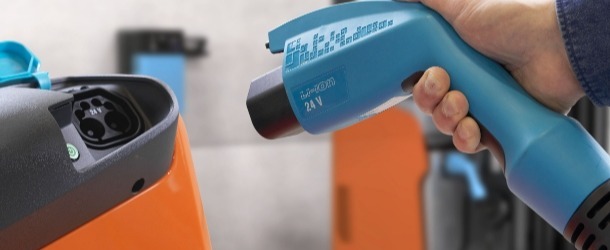Lead-acid battery trucks have a long and proven track record of reliability. They also maintain a higher and more consistent voltage than other batteries, leading to increased productivity in the workplace.
But what are lead-acid batteries? How do they work and what advantages can they offer your business? Keep reading to find out.
- What are lead-acid batteries and how do they work?
- What are the advantages of lead-acid batteries?
- What are the disadvantages of lead-acid batteries?
- What are your other battery options?
What are lead-acid batteries for forklift trucks and how do they work?
Lead-acid batteries are the most traditional type used in the material handling industry to power electric forklift trucks. This battery contains charged plates suspended in a mixture of sulfuric acid and water.
They work by suspending the electrolytes between two charged plates within the acid mixture. Evaporation occurs during the operating and charging process.
Compared to other solutions, they require more maintenance. Maintaining these batteries involves adding water to the battery and cleaning it frequently.
Lead-acid batteries also require a separate charging room and take 8-12 hours to charge fully. The battery has 1,500 charging cycles and charges best at around 20%.
What are the advantages of lead-acid battery trucks?
Although lead-acid batteries require more maintenance than other solutions, they also have many great benefits. Keep reading to discover what they are.
A cost-effective solution.
Lead-acid battery powered trucks are the cheapest option on the market. Solutions such as lithium-ion batteries are currently around twice as expensive as lead-acid batteries. Given their lower cost, lead–acid can be a more economical option for businesses with a single-shift operation or those working with a smaller budget.
A recyclable product.
This battery type is 99% recyclable and could be the right option if you are working towards meeting sustainability goals. As lead-acid batteries have been around for so long, many recycling programmes are in place for them when they reach the end of their lives.
High levels of durability.
You can use lead-acid batteries for up to five years with good care. This tried and tested technology has been used to power forklift trucks for decades. These batteries can be used for eight hours, depending on the application or environment, before needing a charge or change.
Discover the right energy source for your forklift trucks.
Find out about the different energy source options, pros and cons and how they support your business. To get started, download a copy of our insightful comparison guide.
What are the disadvantages of lead-acid battery trucks?
There are some disadvantages to know about when compared to other solutions.
They require regular maintenance.
The initial cost of purchasing lead-acid batteries may be lower. However, you will need to factor in ongoing maintenance costs to keep them in prime condition. This maintenance can result in unplanned downtime and you will also need to purchase specialised cleaning and watering products.
Longer charging times.
Lead-acid batteries require eight hours to charge and eight hours to cool down. While the battery is charging, you cannot use it. However, purchasing additional lead-acid batteries is relatively low cost, so extra batteries can be stored and changed when required.
They require dedicated storage areas.
Due to the chemicals and gases produced when charging this solution, lead-acid batteries often need dedicated charging areas with ventilation. You will need to factor this additional cost into your budget and ensure you have space.
What other options are available instead of lead-acid batteries?
When choosing an energy source for your trucks, you typically have two other options. These are lithium-ion and hydrogen fuel cells.
Lithium-ion.
In recent years, lithium-ion batteries have become an increasingly popular power source. Lithium-ion batteries always deliver maximum power, regardless of the remaining charge. You can learn more about this solution and its benefits here.
Hydrogen fuel cells.
Hydrogen fuel cell power has long been regarded as an environmentally friendly option. It offers many practical benefits too. This solution is known for high levels of productivity, reliability and flexibility. You can find out more about this solution and if it is right for you here.
Knowing which solution is right for your business will come down to several factors. We have created an informative resource to help you compare your options and choose an option that meets your needs.
What is included in our insightful comparison guide?
We take a detailed look at the three energy source options for powering your trucks; lead-acid, lithium-ion and hydrogen fuel cell. The guide compares initial costs, ongoing costs, maintenance requirements and performance. You can take one step closer to finding the right energy source for your forklift trucks by downloading your copy. 
